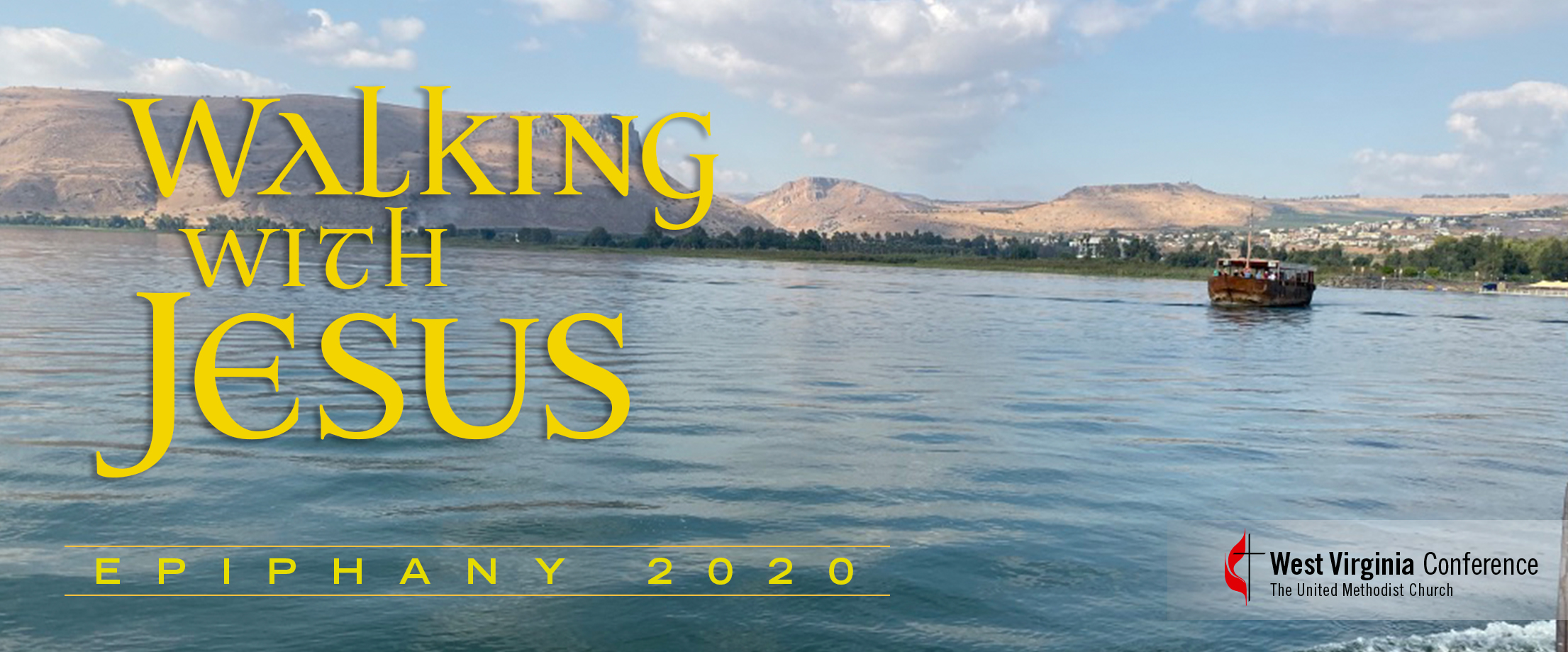
Epiphany is winding down and the season of Lent begins on Wednesday, but first we have Transfiguration Sunday.
The scripture lessons for this Sunday are: Exodus 24:12-18, Psalm 2, Psalm 99, 2 Peter 1:16-21, Matthew 17:1-9.
Rev. Ford Price
Epworth-Ripley
Little Kanawha District
Matthew 17:1-9
The Transfiguration in the Holy Land
During a recent trip to the Holy Land, I stood on top of the ruins of Megiddo. It has been an ancient place of worship, palaces, and fortresses for several millennia, sitting between the mountains of Mount Tabor and Mount Carmel in the Jezreel Valley.
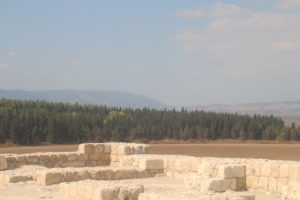
Overlooking Mt. Carmel from the Palace complex at Megiddo.
I pondered how at many times over history Megiddo appeared to be the center of religious, political, and military might; today’s ruins reveal how fleeting and elusive human power and control actually are.
Priests, kings, and warriors would come and go, rise and fall. Even mighty King Solomon’s reign, that was sustained partly by unparalleled wealth and chariots at Megiddo, would unravel and be divided between the Northern and Southern Kingdoms after his death.
As Psalm 33:16-20 reminds us: “A king is not saved by his great army; a warrior is not delivered by his great strength. The war horse is a vain hope for victory, and by its great might it cannot save. Truly the eye of the Lord is on those who fear him, on those who hope in his steadfast love. To deliver their soul from death, and to keep them alive in famine. Our soul waits for the Lord; he is our help and shield.”
It was on these two mountains, Mt. Carmel and Mt. Tabor, overlooking this notable valley and fortress,
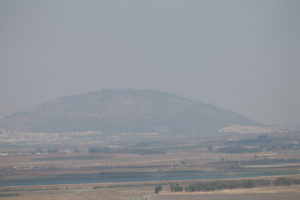
Mt. Tabor as seen from the Palace complex at Megiddo
a vestige of human pride and rule, that real power was demonstrated. These demonstrations would be precursors to the prophesized show of triumphant power in the final and decisive battle between good and evil that will be won by God at the very same site, Armageddon (Hebrew Har Mageddon, “the mountain or hill of Megiddo”), according to Revelation 16:16.
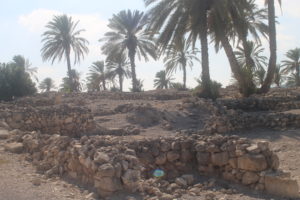
Remains of the stables at Megiddo, once a sign of great military power
In stark contrast to the world’s way to power, the two mountain revelations (actually three as seen below), show us clearly what the prophet Zechariah declared, “Not by might nor by power, but by my Spirit, says the LORD Almighty.” (Zechariah 4:6).
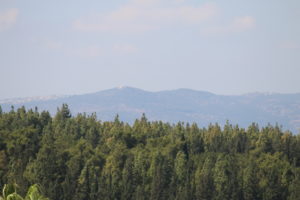
Mt. Carmel as seen from the Palace complex at Megiddo
On the northwest side looms Mt. Carmel, the place where the Prophet Elijah would take on the prophets of Baal (I Kings 18:20-40).
To the northeast is Mt. Tabor, where Elijah appears again in a mighty show of God’s presence at Jesus’ Transfiguration (Matthew 17:1-9). Elijah figures prominently in both stories.
In the first, he challenges the prophets of Baal who supported the evil King Ahab and Queen Jezebel in their opposition to true followers of God. To demonstrate God’s judgement over their rebellion and evil deeds, he challenges the King to sort of a duel to prove that the LORD is the one true God over Baal and to call the people back to God.
Ahab summoned 450 prophets of Baal and 400 prophets of Asherah to the top of Mt. Carmel. The prophets of Baal and Asherah would spend all day calling upon their gods to consume by fire the two bulls placed on the wood. Nothing happened. When they gave up, Elijah went the extra length to show God’s awesome power by pouring four large jars of water on the cut-up bulls, soaking the carcasses and the wood and filling a surrounding trench. Elijah simply offered a prayer, which is in contrast to a full day of dancing, self-mutilation, and wailing by the pagan prophets, and the fire fell from heaven so completely that it burned up the sacrifice, the wood, the stones, the soil, and “licked up” all the water. It was a great victory and demonstration of God’s power. But there’s more to revelation than a show of power as Elijah would soon learn.
What is surprising is what immediately follows this great victory. Elijah is not elated but sad; he even wants to end his life. He has had enough. Instead of great confidence and courage, he is afraid. Jezebel is angrier than ever at Elijah and seeks to kill him. He runs for his life and ends up on another significant mountain, Mt. Horeb, known as the mountain of God. There God met directly with Moses, blessed him, and gave him the Ten Commandments. It was on Mt. Horeb that Elijah discovered the true way to power, faith, and hope, tying him now to the Prophet Moses and the great revelation of God there.
The LORD asks Elijah what he was doing there. He replies that he has been very zealous for God by standing up to the pagan prophets and being the only true prophet left after the others had either been murdered or abandoned their role as God’s representatives. The Lord then said in I Kings 19:11-12, “’Go forth, and stand upon the mount before the Lord.’” And behold, the Lord passed by, and a great and strong wind rent the mountains, and broke in pieces the rocks before the Lord, but the Lord was not in the wind; and after the wind an earthquake, but the Lord was not in the earthquake; and after the earthquake a fire, but the Lord was not in the fire; and after the fire a still small voice.” (RSV)
Elijah gets a direct encounter with God, similar to Moses, and discovers real power is found not in the outward demonstrations but in hearing the voice of God. Yes, listening to God and not the tempting voices of the world is where true power resides; for it is God at work in the heart of the listener. Outward power and force will never change the hearts of people, but the Holy Spirit who speaks to us the living, transforming word of God will. Elijah was encouraged and ready to return to do God’s bidding; he would anoint two kings and his successor, the Prophet Elisha, as God commanded.
That brings us to the Transfiguration where Elijah shows up with Moses to meet directly with Jesus. This is the third mountaintop experience for Elijah, and now he meets Jesus face to face, while three disciples, Peter, James, and John, witness the conversation. We will never know what they talked about. Not even Peter, who overheard their conversations, could say, but he, like Elijah, discovered true power. It came not so much in the brightness of the overwhelming vision but in hearing directly the voice of God. The voice from heaven spoke, “This is my Son, the Beloved; with him I am well pleased; listen to him!” (Matthew 17:5)
Yes, listen to him; that’s the key. Peter, reflecting on this experience of power later in life, writes in II Peter 1:18-19, “We ourselves heard this voice come from heaven, while we were with him on the holy mountain. So we have the prophetic message more fully confirmed. You will do well to be attentive to this as to a lamp shining in a dark place, until the day dawns and the morning star rises in your hearts.”
Peter offers to the early church and us the word from the mountaintops: we will do well to listen to the message so the morning star, God’s Messiah, will rise in our hearts to fill us with his power, grace, and love. We will be led in the strength of the Lord to do his bidding. God will have our backs. There is no need to succumb to the world’s ways of manipulation or force since we have heard from God directly through scripture and the Holy Spirit. “First of all you must understand this, that no prophecy of scripture is a matter of one’s own interpretation, because no prophecy ever came by human will, but men and women moved by the Holy Spirit spoke from God.” (II Peter 1:20-21)
God ultimately showed his power, not with outward force, but through Jesus who came not to be served but to serve. Listen to him! He loved and forgave instead of condemning. Listen to him! He said, “I give you a new commandment, that you love one another. Just as I have loved you, you also should love one another. By this everyone will know that you are my disciples, if you have love for one another.” (John 13:34-35) Listen to him! It is his way, the way to self-denial and the cross, that leads to resurrection victory and power to conquer sin, evil, and death forevermore. Listen to him! More important than outward demonstrations of power is a personal encounter with Jesus.
Yes, God speaks, even from the ruins of a fortress, palace, and pagan worship center. I lifted my eyes unto the hills that day and wondered from where my help comes? (Psalm 121:1) I discovered my help in the Lord who made heaven and earth, who comes not so much in the outward shows of power but in that “still, small voice,” in the recesses of my heart where I listen to the word of God and encounter the promptings of the Holy Spirit.
There is the real power to change me into a faithful follower of Jesus. If I will only listen to him? Will you?
Joe and Judi Kenaston
Joe - District Superintendent/Dean of Cabinet
Judi - Conference Secretary
Southern District
Exodus 24:12-18
The alarm went off at midnight. At 12:20 a.m., we were to gather with the others who were hiking to the top of Mount Sinai. We dressed quickly and headed out in the dark with a mixture of excitement and apprehension. This is what we had planned to do when we came to Egypt, but the night before we were to climb, the rumors swirled among the group. “The temperature at the top will be below freezing in the morning;” “You couldn’t possibly make it without sturdy hiking shoes - those tennis shoes won’t work;”
“It takes four hours to walk up and the last hour is exceedingly difficult due to oxygen deprivation.” The rumors, some true and others exaggerated, had whittled the group down to eight.
Our little band joined a number of other pilgrims heading up the holy mountain by foot and on camel. Our rented walking sticks, a backpack carrying our breakfast, a pair of gloves and a small plastic flashlight purchased in the hotel gift shop were our supplies.
The stars were out in the cloudless sky but the moon which we had glimpsed earlier in the evening had disappeared. Mohammed, our Bedouin guide, headed us toward the path and we started up, passing a few people who were returning from the top. We fell into a pattern - those in the front warning the followers of places where the drainage of the path made a surprise drop off which could cause us to stumble. Along the way there were small huts where Bedouins provided climbers with a stop for coffee and rest. We climbed and climbed, occasionally pausing to rest and let the stragglers catch up or to let a camel pass. The fear of freezing temperatures had inspired multiple layers which we began stripping off as we climbed. Being cold wasn’t an issue during the strenuous climb.
The darkness enveloped us. The climb invigorated us. The spirit of God surrounded us.
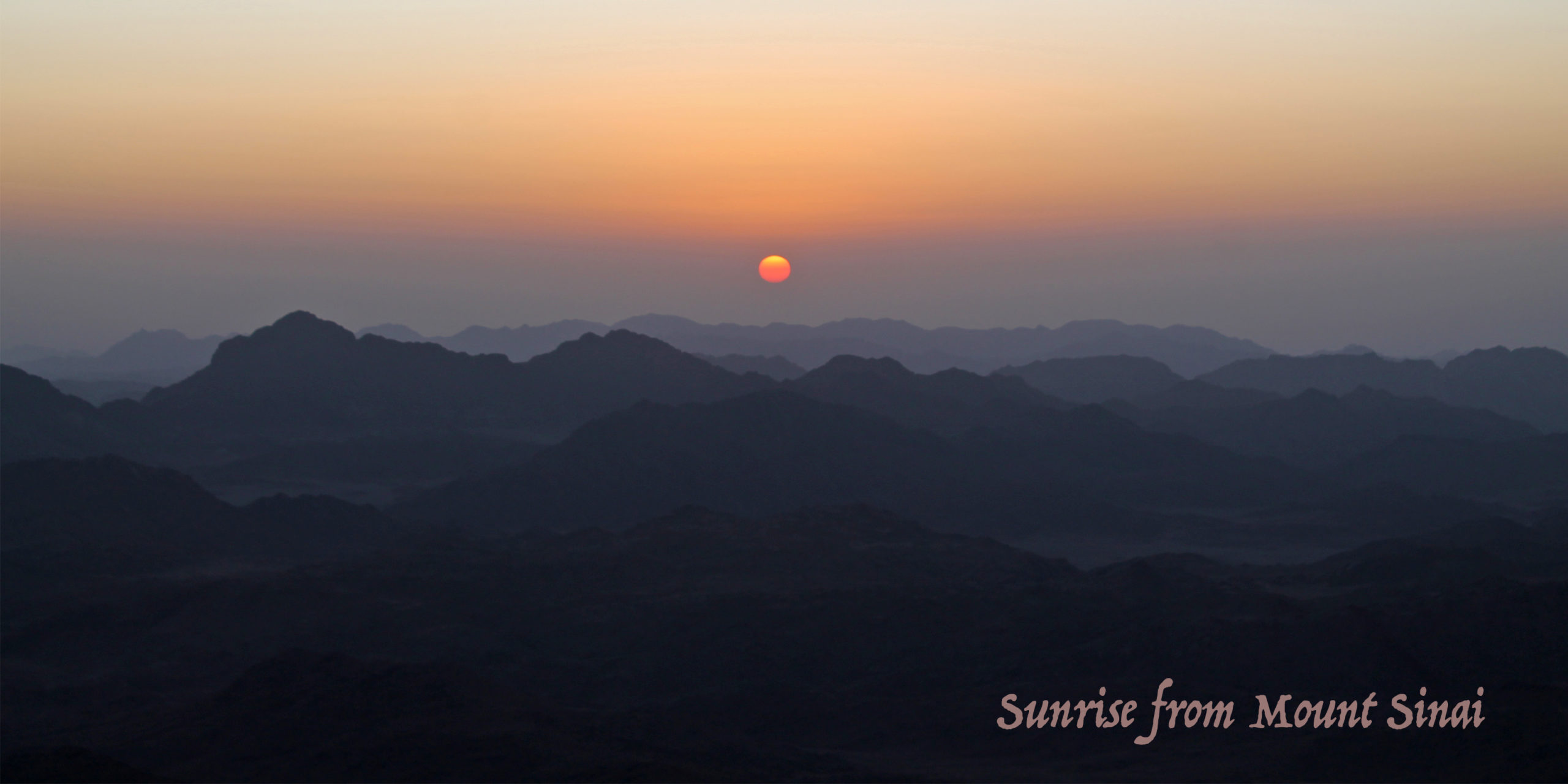 In Exodus 24, Moses is called by God to climb the holy mountain and in this passage he takes his assistant, Joshua, and they begin the ascent to experience God’s holy presence.
In Exodus 24, Moses is called by God to climb the holy mountain and in this passage he takes his assistant, Joshua, and they begin the ascent to experience God’s holy presence.
The last part of the climb we had been told was 750 steps. Although we had envisioned stairs, we discovered rugged and uneven rocks steeply ascending. It was rigorous. We encouraged each other: “It’s not far now!” After 3 hours and 15 minutes, we arrived at 4:15 in the morning, sat on the ground, ate our breakfast, and waited in the cold (not freezing!) for the sun.
When Moses arrived on the top of the mountain, a cloud covered the top and after six days “the Lord called to Moses from the cloud” (Ex. 24:16). Moses remained on the mountain in the Lord’s presence for forty days and forty nights. Moses was made a new person on the mountain and the people of Israel took another step on the journey of faith covenant.
As we watched the first light begin to illuminate the rugged, barren mountain range that surrounded Mount Sinai, we offered prayers of praise to the presence and glory of God. We felt the closeness of God’s holiness and immanence.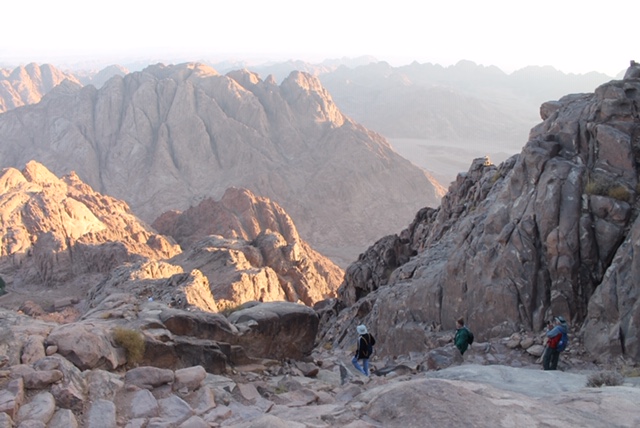
We recognized Moses met God on this mountain and received the Ten Commandments while the Israelites encamped at the bottom of the mountain cast a golden idol. Later, Moses returned to the mountain with Joshua, and stepped into the cloud of glory; God renewed the covenant with God’s people. We eagerly watched the sky change colors from grey to a light purple to the burst of yellow appearing on the horizon. Then we were transfixed as the top of the orange orb began to slide above the mountain range in front of us.
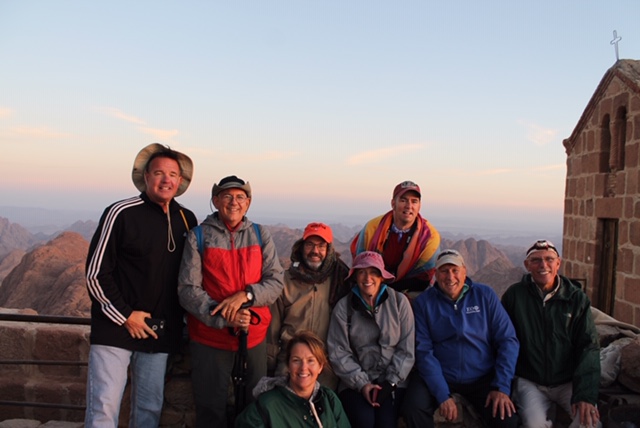 Our hearts sang as the sun broke free of the distant mountains. We basked in the light of God’s glorious new day.
Our hearts sang as the sun broke free of the distant mountains. We basked in the light of God’s glorious new day.
The day had dawned. Our journey down was in the light! We could see where we had climbed and we didn’t need anyone to point out the path to us. We had literally walked in darkness and now we had seen light.
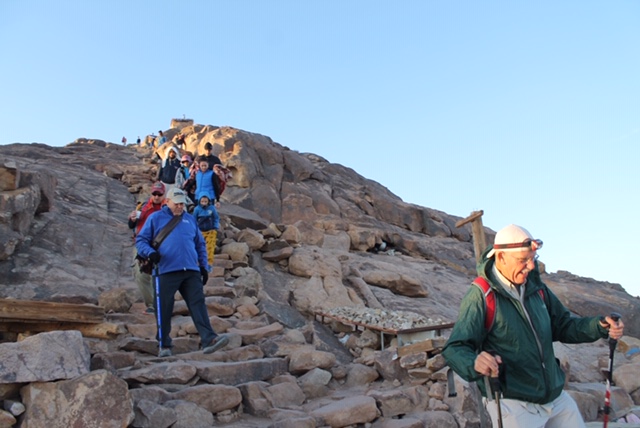 God spoke to us on the mountain. But, God also sent us on our way. We went down the mountain as changed, transformed people.
God spoke to us on the mountain. But, God also sent us on our way. We went down the mountain as changed, transformed people.
We don’t need to climb a mountain to see the face of God, but we are grateful for those mountain top experiences that lift us and transform us.
Joe and Judi Kenaston